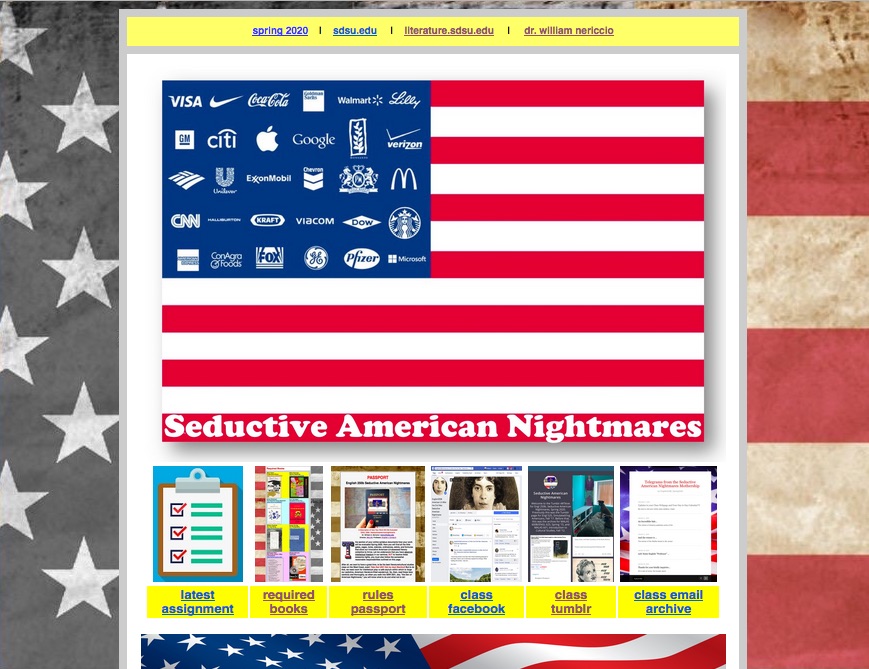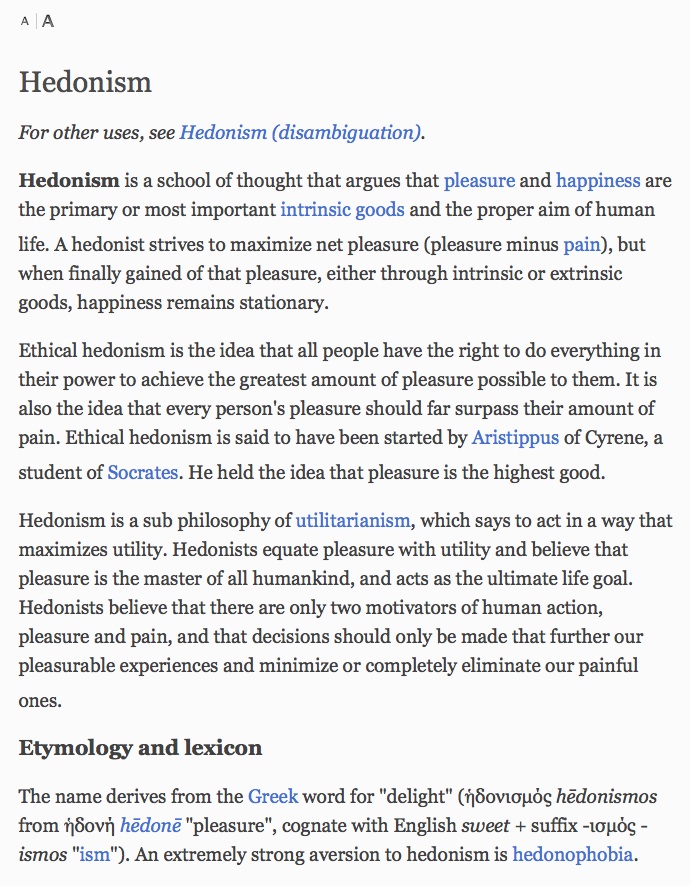
Your Spring 2020 English 250B
Imagination Challenge
So many students fret and stress
over writing assignments--but they
should not. I mean, after all,
this is an "English" class
and writing essays is as "English
class" as you can get. It would
be like freaking out if you walked
into your Chemistry lab and fainting
at the sight of a beaker, screaming
at the appearance of a test-tube.
Still, I get it.
But we can do things another way. We
do not have to be incarcerated by
tradition nor policed by conventions.
We can, for this class, with our
dazzling Seductive Nightmarian talents, write
pieces that organically represent our
encounters with complex writers, artists,
photographers, and directors in ways
that actually bring us pleasure.
I was going to consult the Oxford
English Dictionary on hedonism* but
the good old Wikipedia had a clearer
explication of the term:
*free! with your registration to SDSU--check out
hedonic, the root term for hedonism here.

So your main goal with this essay will be to
select a subject-area and objects (at least two
drawn from our required list of texts--film, book,
art, photography, television... ANY texts) that
give you pleasure to explore, that delight
your mind, that satisfy your unapologetic
curiosity.
And here, for your pleasure,
are some prompts you are free to
use, adapt, warp, re-invent, reshape, mangle,
deconstruct, destruct, etc. Though, between
you and me, I hope you use the last prompt
as that one has the most value!
Good luck!
- IMAGINATION
CHALLENGE ESSAY DUE, Friday,
April 17, 2020 at 12noon, emailed to me at bnericci@sdsu.edu.
- NO LATE PAPERS ACCEPTED
- EARLY DRAFTS WELCOME
- 8-10 PAGES; TYPED; DOUBLE-SPACED; CAREFULLY PROOFED!; CLEVER, EVOCATIVE TITLE.
- All
A-level essays will have at least four scholarly sources
woven into the
argument of the essay--the best online sources for
literature/cultural studies research include Project
Muse and JSTOR.
MLA-style
or University
of Chicago-style citations/footnotes
are cool (I prefer Chicago, but it really does not
matter to me).
- ESSAYS ON IMAGE-BASED TEXTS (ART, FILM, TELEVISION) SHOULD INCORPORATE SPECIFIC IMAGES THAT HELP MOVE YOUR ARGUMENT FORWARD--THESE IMAGES SHOULD BE CAPTIONED AND SOURCED IN THE WORKS CITED OR VIA CAPTION. And these images DO NOT count toward your 8-10 pages of writing so use with impunity!
- Before
you start to write, READ at least ONE of these outstanding pieces of
literary criticism--remember! Do NOT read them for content (well you
can if you wish) ... Read them like a pirate/scavenger, noting how they
do introductions, how they move from paragraph to paragraph, and,
especially, how they weave DIRECT QUOTES from the writers they are
studying into their own analysis!!! Monkey see, Monkey do, is actually
good advice for the aspriring literary critic. Folder of FOUR
essays by Gates, Vendler, Said, and Spivak, here. Spivak is the hardest!
PROMPTS
1.One of the first propositions floated
in our seminar focused on the idea of a
Baudrillard-inflected notion of the Simulacra--
our eye was glued to processes of pretending,
copying, aping, mimicking with a specific focus
on storytelling from the United States and the
Americas. Do a little more reading from Baudrillard's
oeuvre* and write an essay that uses at least two
primary, required texts/film/etc from our reading
to say something unique simulation in a post-1960
American context.
*This one is curious: America, trans. Chris Turner, London: Verso, 1988; 1989. (English)
2. Redefine the concept of the "Seductive
American Nightmares" using your own focus/vision/insight as
you explode (replace?!) the term even as you
explore any two works we have or will encounter
this semester? Do feel free to focus
on works we have not gotten to yet in class.
Works means any combination of works! Diane Arbus
+ Faulkner? Why not?! Welles and West!? Sure thing!
James Baldwin and Steinbeck? Smashing. You are
the author! You are my professors! Go for it!
3. Is there a sexual dimension that connects works
of American Literature from the Civil War to the
present? Explore our authors/directors
evolving notions of sexuality as they unfold of
in any two or three works we have read/watched/
experienced this semester.
4. Can a Painting talk to a Novel? A photograph
speak to a short story or essay? Compose an
essay that contrasts/compares a text this semester
that was written with one that is composed of
pictures--for instance, Hernandez + Vonnegut; Raoul Peck
with Toni Morrison. Ultimately your essay is a meditation
on the semantic and the semiotic conceived
simultaneously. The thematic focus? That is
up to you.
5.Literature and Existentialism--bring yourself
up to speed by selecting/reading a key work from
the existentialist tradition: by Wittgenstein,
Nietzsche, Camus, or Sartre. Use that philosophical
text and fuse it somehow with a work we have
read in class this term.
6. What is the Erotic dimension of the American Psyche--
is the erotic necessarily neurotic? Are neurotics erotic? Consider
the relationship between the erotic and the
psychological in any two works from the semester.
7. Literary Criticism/Film Criticism. Locate
scholarly articles on any two the artists/writers we
have experienced this semester. Try to find articles
that you are decidedly at odds with or that come up
short in ways you find annoying. Write an essay that
directly challenges the findings of these two scholars;
make sure to incorporate your own thesis in your essay.
8. Write a missing chapter in Tex[t]-Mex--one that
either focuses on Latinx or Latina/o phenomena/texts
that I left out of the book or that expands beyond
the Latina/o dimension onto works by other American
ethnic bodies. Try to ape/bend/reshape the manner
of the book as much as you wish to create your own
voice, but do include illustrations.
9. What are "permutations of race" in an American
Literary context--how does race/racism/ethnicity
factor in any two works we have or will encounter
this semester?
10.* Invent your own thesis focused on any works you
choose from our class plus any one work you want
to add in from another class or from your own
reading/screening/museum-going. Written proposal due
to me via email or in-class, typed, delivered
to me via email to bnericci@sdsu.edu by
midnight, Wednesday, April 8, 2020.
Go have fun! I mean it!
